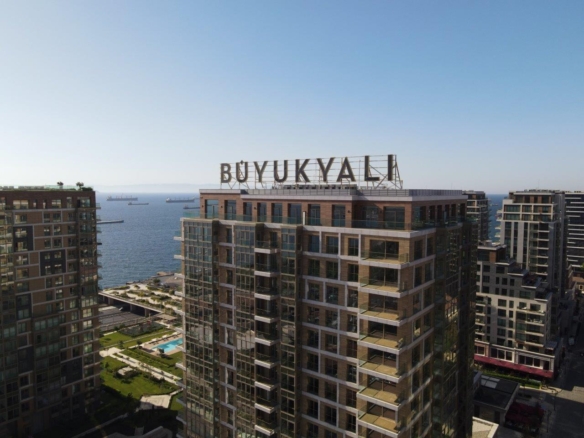Buying property or obtaining a residence permit in Turkey is a transparent and legally protected process for foreigners. Whether you’re looking to invest, relocate, or retire, Turkey offers a perfect blend of lifestyle, safety, and opportunity.
1. Questions about property purchase
Can a Foreigner Buy a House in Turkey?
Yes, foreigners can legally purchase property in Turkey and enjoy nearly the same rights as Turkish citizens. Turkey’s property laws—based on the EU Civil Law system—allow full freehold ownership, giving buyers complete control and inheritance rights over their properties.
Foreign nationals can buy real estate across most of Turkey, except in restricted military or sensitive zones.
Key Highlights:
- Full Ownership: You can own the property entirely and pass it to your heirs.
- Legal Support Recommended: Hire a local lawyer to guide you through contracts and registration.
What Is the Property Tax Rate in Turkey?
When buying or selling a property, Turkey charges a 4% property purchase tax on the sale price.
Typically, both parties split this cost—2% each for the buyer and seller.
The tax is payable to the Turkish Tax Authority during the title deed transfer (Tapu).
Key Points:
- Total Tax: 4% of the sale price.
- Usually split equally between buyer and seller.
- Mandatory for completing ownership transfer.
What Is a Title Deed (“Tapu”) in Turkey?
A Title Deed, or Tapu, is the official legal document proving ownership of real estate in Turkey. It lists property details, such as location, size, type, and the owner’s name.
Properties in Turkey are freehold, meaning they can be co-owned by multiple individuals without limits and are automatically transferred to heirs or as per a will.
Tapu Details Include:
- Property address and size.
- Owner’s legal name.
- Type of property (land, apartment, etc.).
- Ownership and inheritance rights.
What Are the Expenses When Purchasing Property in Turkey?
When buying a home in Turkey, consider these costs in addition to the property’s price:
| Expense Type | Description | Estimated Range |
|---|---|---|
| Appraisal Report Fee | Mandatory property valuation report | Varies by property |
| Property Purchase Tax | 4% of sale price (split 2% each) | Depends on property value |
| Lawyer Fee | Optional but recommended | Based on service |
| VAT (KDV) | Between 1% and 20% | Based on property type |
| Insurance (DASK) | Compulsory earthquake insurance | Small annual fee |
| Utility Connection | Electricity & water connection | Regional variation |
| Maintenance (Aidat) | Building or site maintenance | 5,000–20,000 TL/month |
| Furnishing | Optional | Depends on taste |
How Long Does It Take to Buy Property in Istanbul?
The process typically takes a few days to several weeks, depending on payment method and documentation.
Main Steps:
- Pay a deposit and sign the reservation form.
- Make the down payment or full payment.
- Sign the sale agreement or notary contract.
- Schedule your Tapu (title deed) appointment.
- Receive your title deed on the appointment day.
Which Documents Are Required to Buy Property in Turkey?
To buy a property, prepare the following:
- Passport (valid).
- Turkish Tax Number.
- Utility Bill from your home country (for opening a bank account).
- Two Passport Photos (3×4 cm).
When Can I Move into My Home After Purchase?
Move-in times depend on your developer’s policy:
- New Builds: Usually after 50% of the payment is made.
- Full Payment Requirement: Some developers require 100% payment before handover.
What Are the Taxes and Legal Fees Associated with Property Purchase in Turkey?
- VAT: 1%, 10%, or 20% (depending on property).
- Title Deed Fee: 4% of sale price (shared or paid by buyer).
- Legal Fees: Lawyer, translator, or notary costs may apply.
Is a Valuation Report Required for Property Purchase in Turkey?
Yes. Foreigners must obtain a valuation report to confirm property value, especially for Citizenship by Investment eligibility.
Exceptions:
Publicly listed developers (REITs/GYOs) may be exempt.
How Much Does a Valuation Report Cost in Turkey?
What Is the Cost of a Notary Agreement and Transaction in Turkey?
- Notary Fees: Around 1% of the total property price.
- Sworn Translator: Required for non-Turkish speakers.
- Power of Attorney (POA): Between 4,000₺ – 20,000₺.
What Is the Maintenance Fee for Properties in Turkey?
Maintenance fees, known as “Aidat”, cover communal services such as cleaning, security, and pool maintenance.
Range: 5,000 TL – 20,000 TL/month depending on facilities and location.
When Can I Get My Title Deed Appointment?
- Timeline: Usually within 15 days of application.
- Responsibility: The seller typically arranges the appointment.
Can I Buy Property in Turkey with an Installment Plan?
How Much Tax Should I Pay on Rental Income in Turkey?
What Is the Tax Rate When Selling Property in Turkey?
- No Tax: If sold after 5 years of ownership.
- 20% Tax: If sold within 5 years, applied to profit difference (capital gains).
2. Questions About Residence Permit
Why Should I Get a Residence Permit in Turkey?
Turkey is a democratic, Westernized Muslim country with a high standard of living and excellent global connectivity.
Key Benefits:
- Safe, family-friendly environment.
- Beautiful nature, beaches, and climate.
- Free healthcare and education access.
- Easy business setup.
- G20 & NATO member, EU candidate.
- Great location between Europe, Asia & Africa.
Can I Live Permanently in Turkey?
Yes, by obtaining a Residence Permit, you can live in Turkey long-term.
The permit must be renewed periodically based on your residency type.
How Much Does a Turkish Residence Permit Cost?
When Should I Apply for a Residence Permit in Turkey?
How Long Does the Residence Permit Process Take?
Passport Validity Requirements for a Residence Permit
Which Documents Should I Bring for a Residence Permit Application?
Contact us
Join global investors who trust Listing Global for secure, transparent, and expert-led property investments.
- info@listing.global
- Telegram
- 42 Maslak, Plaza Kolektif House, Ahi Evran Cd. No:42, İç Kapi No:559 34398 Sarıyer/İstanbul
 Türkçe
Türkçe العربية
العربية English
English





